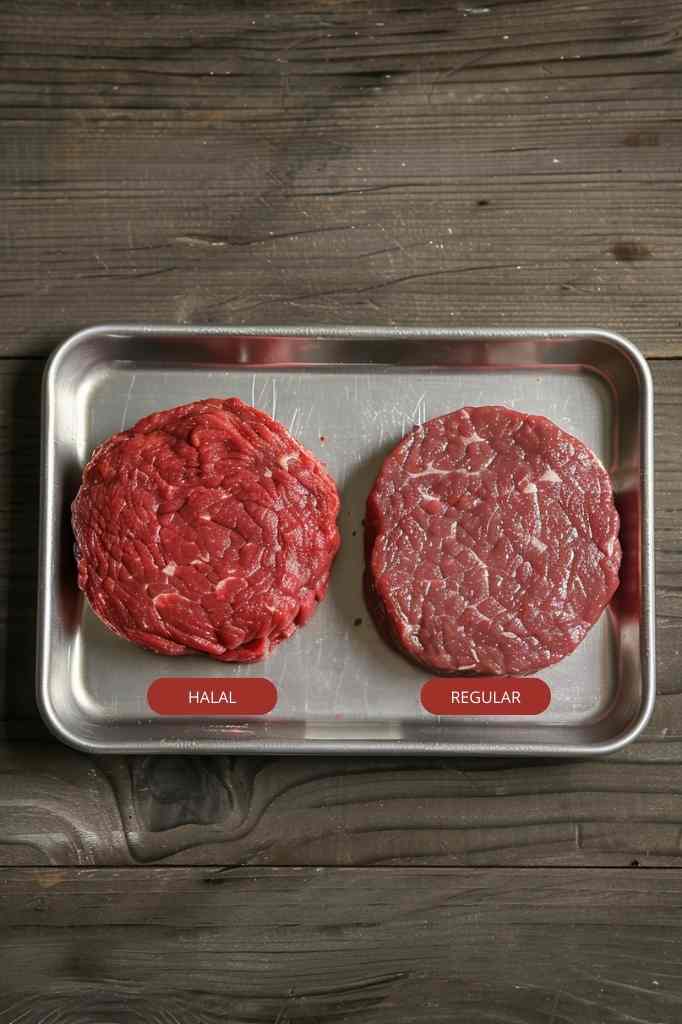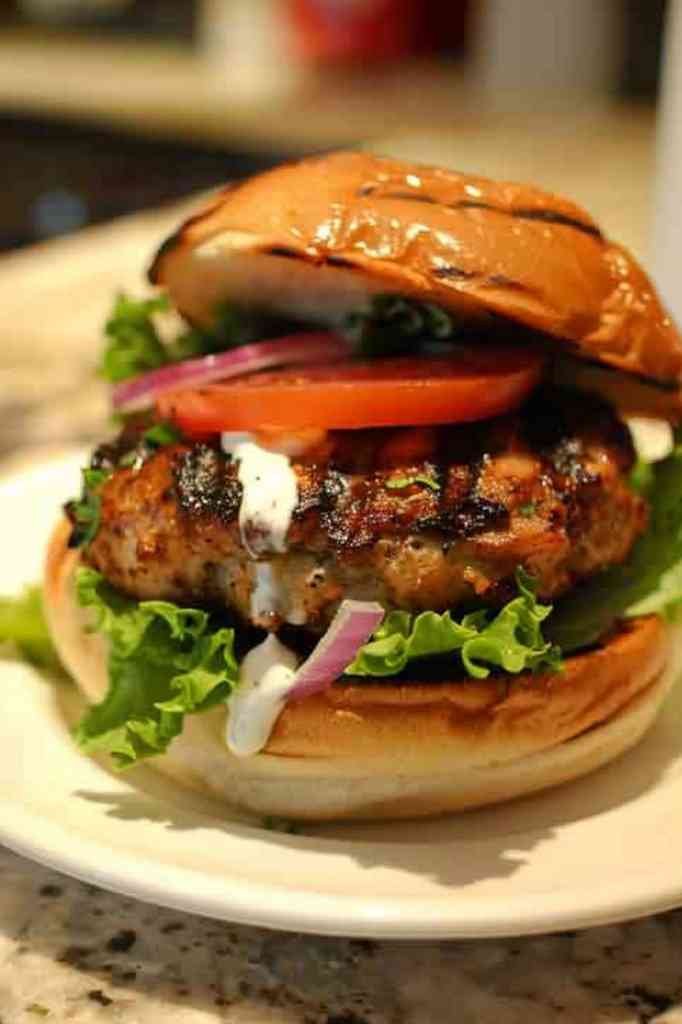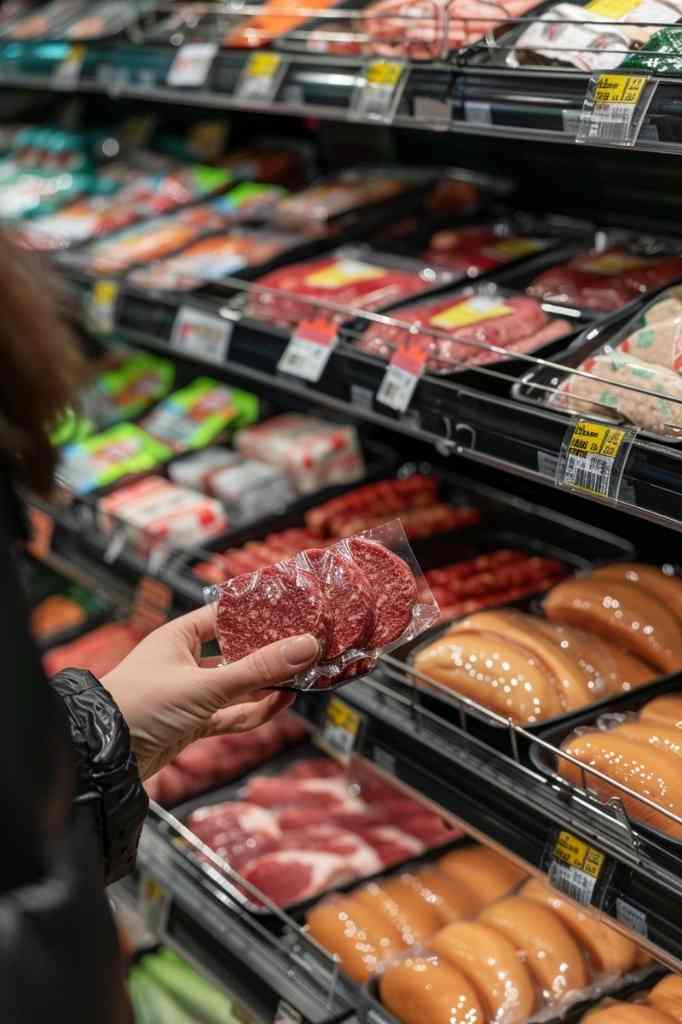Halal burger — it’s becoming a favorite on menus all across the United States, and I totally get why! For me, it’s not just about the religious dietary requirements; it’s about the ethical sourcing, the rich flavors, and the fact that more and more people are discovering how amazing they are. Whether you’re someone who practices Islam and wants meals that are fully compliant, a curious foodie looking to try something different, or even just someone who cares about clean ingredients, halal burgers bring a refreshing twist to a beloved classic.
I’ve personally fallen in love with them because they hit all the right notes — flavorful, juicy, and made with care. Plus, they’re more accessible than ever! In this guide, we’ll dive into what makes halal burgers stand out, how they’re made, where you can find them, and why they’ve become such a hit with so many people from all walks of life.
So, let’s start by breaking down the basics of halal burgers. Trust me, you’ll want to know the story behind this delicious trend!
Table of Contents
Understanding the Concept of a Halal Burger
What Does “Halal” Mean in Food Context?
The word “halal” in Arabic translates to “permissible”, and in terms of food, it refers to what is allowed under Islamic dietary laws. For meat to be considered halal, it must come from an animal that was slaughtered in the name of God, following a specific method known as Zabiha. The process also requires the animal to be healthy at the time of slaughter and treated ethically throughout its life.
Halal food isn’t limited to meat—it’s a comprehensive approach that covers preparation, ingredients, and handling. In the context of burgers, this means not only using halal-certified beef or chicken but also ensuring that the buns, sauces, and even the utensils are free from non-halal contamination, such as pork or alcohol-based ingredients.
Key Components of a Halal Burger
A true halal burger includes several critical elements that separate it from a standard burger:
- Halal-Certified Meat: The patty must be made of meat sourced from an animal slaughtered according to Islamic law. This includes halal beef, chicken, or even lamb.
- Clean and Ethical Processing: Slaughtering should take place in a hygienic environment where no cross-contamination occurs with non-halal items. The process emphasizes cleanliness, which often makes halal meat attractive even to non-Muslims.
- Non-Alcoholic and Pork-Free Ingredients: No bacon, ham, or alcohol-based flavorings are used in the patty or toppings. Even sauces like Worcestershire must be scrutinized for hidden ingredients.
- Proper Certification: Reputable halal burger brands carry certifications from trusted organizations like IFANCA, Halal Monitoring Services (HMS), or Islamic Services of America (ISA).
A halal burger, therefore, isn’t just about the meat—it’s a full commitment to clean, ethical, and lawful eating that respects religious beliefs and food safety standards.
Ingredients That Make a Halal Burger Authentic
Approved Halal Meats for Burgers
At the heart of every halal burger is one core component: halal-certified meat. This isn’t just about checking a box—it’s a commitment to quality, ethics, and religious standards. For meat to be halal, it must come from an animal slaughtered by a mentally sound adult Muslim, invoking the name of Allah during the process. The animal must be healthy, and the blood must be fully drained. That’s why halal beef, chicken, lamb, and even turkey are the top choices for patties.
Let’s break down a few popular options used in halal burgers:
| Meat Type | Characteristics | Common Usage |
|---|---|---|
| Halal Beef | Juicy, rich, and flavorful | Traditional beef burgers |
| Halal Chicken | Leaner, lighter taste | Grilled or spiced patties |
| Halal Lamb | Earthy, slightly gamey flavor | Mediterranean-style burgers |
| Halal Turkey | Mild and lean, great for low-fat options | Healthy burger alternatives |
Many consumers also choose grass-fed halal meat or organic halal meat, which adds another layer of health and ethical benefits. The result? A cleaner, safer, and more flavorful burger that aligns with Islamic dietary laws—and appeals to a much broader audience.
Don’t miss our burger bowl recipe guide for a creative twist on traditional halal burgers without the bun.
Sauces, Buns, and Add-ons: Ensuring Everything is Halal
One big misconception is that the only thing to consider in a halal burger is the meat—but that’s far from the truth. Every component of the burger must align with halal standards:
- Buns should be free from lard, mono and diglycerides of animal origin, and alcohol-based preservatives. Opt for buns labeled as halal-friendly or made with plant-based emulsifiers.
- Cheese must be rennet-free or made using microbial rennet instead of animal-derived enzymes.
- Sauces like BBQ, mayonnaise, and mustard must be alcohol-free and contain no non-halal ingredients like bacon bits or pork enzymes. Even a common ingredient like Worcestershire sauce might contain anchovies or vinegar fermented with alcohol—so double-checking is key.
- Pickles and Seasonings need to be free of artificial colors or preservatives derived from non-halal sources. Stick to clean-label ingredients whenever possible.
Here’s a list of commonly halal-safe toppings and add-ons:
- Lettuce, tomato, red onions, jalapeños
- Halal turkey bacon
- Grilled mushrooms
- Avocado or guacamole
- Halal hot sauce or garlic aioli
With a bit of attention to detail, every layer of your halal burger can be both compliant and flavorful. Discover great ideas like this gluten-free chicken pot pie if you want to expand your halal cooking skills beyond burgers.
How Halal Burgers Differ From Regular Burgers
Meat Processing Standards: Halal vs Conventional
At first glance, a halal burger might look similar to any other burger—but there’s a world of difference behind the scenes. The most crucial distinction lies in the way the meat is sourced and handled.
Halal meat undergoes a specific slaughtering process known as Zabiha, where:
- The animal is alive and healthy at the time of slaughter
- The slaughter is done by a Muslim who invokes the name of Allah
- The blood is fully drained from the veins
- The entire process respects animal welfare and cleanliness
In contrast, conventional meat processing—particularly in factory farms—often lacks the same level of ethical or spiritual oversight. Animals may be stunned or killed in automated systems without religious invocation, and cross-contamination with non-permissible items is common.
This difference impacts not just religious compliance but also meat quality. Halal meat is often fresher, less processed, and subject to more careful handling.
Here’s a quick comparison:
| Feature | Halal Burgers | Regular Burgers |
|---|---|---|
| Slaughter Method | Zabiha, religiously invoked | Mechanical, no invocation |
| Animal Health | Must be healthy before slaughter | Often overlooked |
| Cleanliness & Handling | Strict hygiene, no contamination | Possible cross-contamination |
| Blood Drainage | Fully drained (improves taste) | Not always guaranteed |
These steps, while rooted in faith, also translate into better quality control and a more respectful approach to food.

Cleanliness and Ethical Sourcing in Halal Burgers
Cleanliness—or “Tayyib” in Islamic food law—is just as important as being halal. That means halal burgers are not only lawful but pure and wholesome in how they’re prepared. Everything from the kitchen tools to the cutting boards must be kept separate from non-halal items to prevent contamination.
What’s more, many halal meat suppliers prioritize ethical sourcing, choosing farms that support humane animal treatment, no growth hormones, and minimal antibiotics. It’s a level of consciousness that resonates with non-Muslim consumers, too—especially those looking for transparency and integrity in their food choices.
Check out our homepage where you’ll find more ethically inspired recipes and food ideas.
So when you choose a halal burger, you’re not just getting a religiously approved meal—you’re choosing a burger with a cleaner, more ethical backstory.
Are Halal Burgers Healthier Than Regular Burgers?
Nutritional Comparison Between Halal and Non-Halal Burgers
When it comes to nutrition, many wonder: are halal burgers actually healthier than the regular ones you find at any burger joint? The answer depends on several factors—but there are definitely some advantages that make halal burgers a smart choice for health-conscious eaters.
Let’s take a look at how the two compare:
| Nutritional Factor | Halal Burgers | Regular Burgers |
|---|---|---|
| Meat Quality | Often organic or grass-fed | May include processed or hormone-injected meat |
| Additives & Preservatives | Usually minimal due to halal processing | Frequently includes chemical additives |
| Fat Content | Typically leaner cuts of meat used | Can be high in saturated fat |
| Sodium Levels | Depends on preparation; generally lower | Often high due to seasoning blends |
Since halal slaughtering includes full blood drainage, the result is often leaner meat, which may carry less saturated fat. Combine that with the trend toward organic, non-GMO, and hormone-free halal meats, and you get a burger that many say feels lighter and cleaner during digestion.
But keep in mind—it’s still a burger. The overall health impact depends on:
- Portion size
- Type of meat used
- Cooking method (grilled vs. deep-fried)
- Sauce and topping choices
A grilled halal beef burger with fresh veggies and a whole-grain bun? That’s a balanced, protein-rich meal. But a double-patty burger with heavy sauce and fried add-ons? Not so much.
Don’t miss our cheesy hamburger potato soup recipe for a savory sidekick that complements a healthier burger meal.
Common Misconceptions About Halal Meat and Health
Let’s bust some myths real quick:
- Myth #1: Halal meat is just a label.
False. Halal isn’t just a stamp—it represents a full food philosophy that emphasizes cleanliness, ethics, and transparency, which can result in better overall food quality. - Myth #2: Halal meat is always expensive.
While some cuts of halal meat can cost more due to certification and sourcing, it’s not always the case. In fact, many supermarkets now offer affordable halal options. - Myth #3: Halal food doesn’t matter unless you’re Muslim.
Actually, many non-Muslims are turning to halal food for its ethical treatment of animals, lower additives, and spiritual roots in cleanliness and balance.
Many dietitians and clean-eating enthusiasts recommend halal meat as part of a conscious eating lifestyle. It’s not just about what’s in your food—it’s also about how that food made its way to your plate.
Discover great ideas like this air fryer chicken bites recipe if you’re leaning toward lighter, protein-packed meals.
Halal Burger Variations
Halal burgers aren’t just for beef lovers. With growing demand for alternatives, you’ve got options—whether you prefer lean halal chicken or you’re aiming for a meatless halal meal.
Halal Chicken Burger Recipe:
Ingredients:
- 1 lb ground halal chicken
- 1/2 tsp paprika
- 1/2 tsp cumin
- Salt, pepper, and garlic paste
- Fresh parsley (chopped)
Steps:
- Mix all ingredients thoroughly.
- Form into patties and grill on medium-high for 3–5 minutes each side.
- Serve with a zesty yogurt garlic sauce and fresh greens.
Discover great ideas like our cranberry mocktail recipe—a refreshing match for spiced chicken burgers.

Plant-Based Halal Burger:
Make sure your ingredients are both vegan and halal-certified. Some popular patties like Beyond Meat and Impossible Burgers are halal in select markets (check the label!).
DIY Version:
- 1 can chickpeas (drained)
- 1/4 cup oats
- 1/2 onion (finely diced)
- Garlic, cumin, coriander, salt
- Blend, form patties, and pan-fry until golden brown.
Top with avocado, tomato, and tahini sauce for a flavorful, non-meat option that fits right into a halal diet.
Don’t miss our pineapple mocktail recipes—perfect to sip alongside your burger feast!
Buying Halal Burgers: What to Look for in Stores
How to Identify Certified Halal Labels
Shopping for halal burger ingredients can feel overwhelming, especially if you’re new to it. The key is to look for trusted halal certifications—these labels confirm that the meat or product complies with Islamic dietary laws.
Here are the most recognized halal certification symbols in the USA:
| Certifying Body | Certification Symbol | Known For |
|---|---|---|
| Islamic Food and Nutrition Council of America (IFANCA) | ✅ Crescent-M logo | Widely accepted halal certifier |
| Halal Monitoring Services (HMS) | 🟩 HMS Seal | Strict Zabiha standards |
| Islamic Services of America (ISA) | 🟨 ISA Certified Logo | Nationwide recognition |
| HFSAA | 🟥 Halal Food Standards Logo | Ensures full halal compliance |
When buying burger patties, ground beef, chicken, or even buns and sauces, make sure these logos are present. Don’t settle for vague labels like “Made for Muslim markets”—proper halal certification is non-negotiable.
In addition to meat, check halal status for:
- Breads and buns (no animal-based emulsifiers or lard)
- Cheese (made with microbial rennet)
- Condiments (free from alcohol or animal byproducts)
- Frozen or pre-cooked halal patties (clearly labeled)
Where to Shop for Quality Halal Burger Ingredients
Wondering where to get the best halal burger supplies? Whether you’re prepping for a cookout or planning a weeknight meal, you’ve got options.
🛒 National Halal-Friendly Stores:
- Whole Foods Market – Offers grass-fed halal beef and organic halal chicken under brands like Crescent Foods.
- Walmart – Carries frozen halal products from Midamar, Saffron Road, and others.
- Costco – Sells bulk packs of Zabiha Halal chicken patties and burger beef (availability varies).
- Trader Joe’s – While not all products are halal-certified, some plant-based options and condiments are suitable.
🌐 Online Halal Meat Shops:
- Boxed Halal – Nationwide delivery, including gourmet burger meat.
- Halal Pastures – Grass-fed, pasture-raised halal beef with high ethical standards.
- Midamar Halal – Offers a wide variety of frozen halal burgers, patties, and sausages.
Pro Tip: Always read the label carefully, especially for imported products. If it says “halal” but doesn’t show a valid certification body, proceed with caution.
Want a great dish to complement your burger night? Check out our steak bites recipe—it pairs wonderfully with a juicy burger and fries combo.

Frequently Asked Questions About Halal Burgers
What is a halal burger made of?
A halal burger is made from ingredients that fully comply with Islamic dietary laws. The patty is typically crafted from halal-certified meat like beef, chicken, lamb, or turkey—sourced from animals slaughtered according to the Zabiha method. But it’s not just about the meat: all components, from cheese and sauces to buns and seasonings, must also be free from non-halal elements such as pork, alcohol, or non-halal emulsifiers. The result? A flavorful, ethically sourced burger built on both taste and trust.
Are halal burgers healthier?
They can be. While being halal doesn’t automatically make a burger low in calories or fat, halal meat is often fresher, less processed, and ethically sourced, with minimal additives. Many halal suppliers avoid growth hormones and excessive antibiotics, which appeals to health-conscious consumers. When paired with whole-grain buns, fresh veggies, and grilled instead of fried, halal burgers can absolutely be a healthier fast food choice.
Don’t miss our strawberry mango smoothie recipe for a refreshing, healthy drink to pair with your next burger.
Where can I buy halal burgers in the USA?
You can find halal burgers in many major U.S. cities at dedicated halal restaurants, food trucks, and even some mainstream chains that offer halal options. For home cooking, stores like Whole Foods, Walmart, and Costco carry halal-certified burger patties. You can also order from online retailers such as Boxed Halal, Crescent Foods, or Midamar Halal, which ship nationwide.
Can non-Muslims eat halal burgers?
Absolutely. Halal burgers are for everyone, not just those who follow Islam. In fact, a growing number of non-Muslim consumers choose halal food for its ethical sourcing, cleaner taste, and quality standards. Whether it’s for health, taste, or principle, halal burgers are quickly becoming a favorite beyond the Muslim community.
How is halal meat different in burgers?
Halal meat differs primarily in how the animal is slaughtered and handled. In halal practices, the animal must be healthy, treated with care, and slaughtered manually while invoking God’s name. The blood must be fully drained, which often results in less gamey, cleaner-tasting meat. Additionally, the production and processing stages must maintain strict separation from non-halal items, ensuring purity and compliance from start to finish.
Do fast-food chains offer halal burgers?
Some do. While not all major fast-food chains in the U.S. offer halal-certified burgers nationwide, select locations of brands like Fatburger, BurgerIM, and The Halal Guys serve halal meat. It’s always best to ask staff directly and look for certified signage or logos on menus to confirm. In larger metro areas with diverse communities, halal options are much more common.

Classic Halal Beef Burger – Recipe Card
Ingredients
- 1 lb halal ground beef 80/20 for juiciness
- 1 tsp garlic powder
- 1 tsp onion powder
- Salt and pepper to taste
- 1 egg optional, for binding
- 4 halal burger buns
- Toppings as desired:
- Lettuce
- Sliced tomatoes
- Halal cheese
- Pickles
- Halal mayonnaise or ketchup
Instructions
- In a large bowl, mix halal ground beef with garlic powder, onion powder, salt, and pepper. Add egg if needed for binding.
- Form the mixture into 4 equal-sized patties. Flatten slightly to ensure even cooking.
- Preheat grill or skillet to medium-high heat. Cook each patty for 3–4 minutes per side or until internal temperature reaches 160°F.
- Lightly toast the buns. Layer with patties, cheese, and desired toppings.
- Serve immediately with a side of baked fries or salad.
Notes
Swap buns for lettuce wraps to make it low-carb.
Always double-check that your cheese and condiments are halal-certified. 📦 Storage: Fridge: Store cooked patties in an airtight container for up to 3 days. Freezer: Freeze raw patties between parchment paper for up to 1 month. 🌟 Nutritional Info (Per Serving):
| Nutrient | Amount |
|---|---|
| Calories | ~420 kcal |
| Protein | 28g |
| Carbohydrates | 25g |
| Fat | 20g |
| Sodium | 400mg |






1 thought on “The Ultimate Guide to Halal Burgers: What Makes Them Special?”